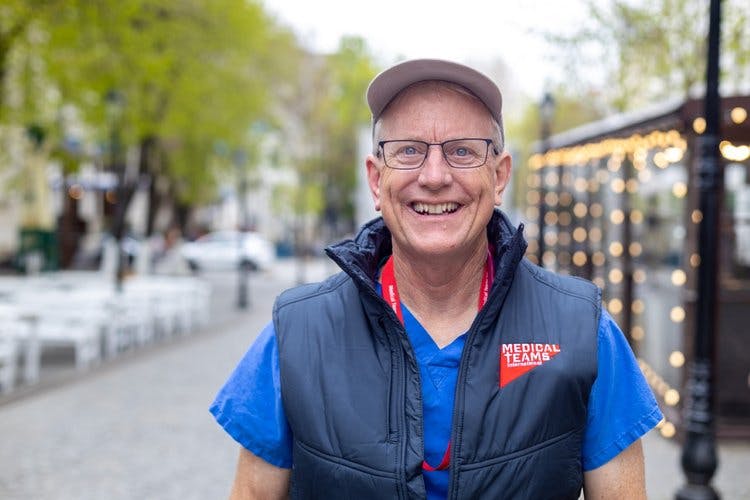Moldova is a neighboring country to Ukraine and considered one of the poorest countries in Europe, per GDP, and yet as of May 2022, has welcomed in over 450,000 Ukrainian refugees fleeing the war in Ukraine. Beyond offering medical care, counseling, and safety, Moldovan government has set up more than 90 housing centers for Ukrainians.* They are a pure example of how much can be done, when your mission is clear and your motives are focused on helping humans.
Much is the case with Dr. Joe, a physician volunteering with Medical Teams International (Medical Teams) in May of 2022. His experience volunteering in a variety of settings throughout his life, and often in the wake of war and natural disasters, had prepared him to jump in to the work Medical Teams International was doing in Moldova to support Ukrainian refugees.
Medical Teams International is a Seattle and Portland based non-profit that takes medical professionals into disaster response zones to provide care to those in need. They also provide medical training, on locations all over the world, so locals can continue to support the relief program after US national staff leaves. This sustainable model is one of the things that Dr. Joe, retired family practitioner from Portland, really values about the work he has done with Medical Teams.
A little over a month after Dr. Joe returned from his Medical Teams deployment, I had the opportunity to ask him what it was like to help Ukrainian refugees in Moldova and specifically what kind of work they were doing.
This is not Dr. Joe’s first volunteer experience, he has done many different trips throughout his life, such as short-term trips for medical response or even longer sabbaticals from work where his entire family moved to places like Nicaragua and Cambodia while he provided medical training to locals and his family integrated into the cultures. “When kids were older we were in Cambodia and they were old enough to do their own projects when we were there…so it’s really informed our family and brought us closer together.” But for this trip to Moldova, he went with other medical professionals and mostly provided primary care.
The location of this medical trip, in Moldova, made it easy to get around, being a European city, it was similar to his home back in the US. The greatest hardship was finding enough translators for the medical professionals, doctors and nurses, that were on site, Dr. Joe shared. The Medical Teams would travel up to two hours from their base in Chișinău to provide primary care and medications to people in refugee centers and, often times, in camps turned into temporary housing. Dr. Joe states he mostly saw refugees for their primary care health concerns and for older refugees he saw many chronic untreated illnesses, “[they had] untreated everything, all of them couldn’t bring medications, whether diabetes, hypertension, stroke, and a smaller handful of much more complicated… illnesses that would require getting them hooked into system at higher level.”
One of the rewarding aspects of this trip, Dr. Joe noted, was the generosity of the people in neighboring countries to Ukraine, such as Moldova. “I’ve never seen that kind of generosity, where they have 10% of the population in people’s homes to help with keeping them safe, getting them food, that’s a huge difference.” This makes for a sharp contrast from where the Ukrainians are leaving and where they are finding help.
“I think the thing most striking is that these people were escaping some of the worst of that humanity can dish out, being attacked without provocation, having to leave everything, house, husbands, fathers, brothers, so forth… and what they were brought into was the best of human nature, that is the generosity of Moldovan families, individuals feeding them, helping them with housing. And that commitment has continued. And the gratitude those refugees expressed was really palpable… how grateful they were to have a home and to have some one talk with them.”
Having volunteered his skills in a variety of places and situations, Dr. Joe states Moldova was a fairly comfortable place to spend time volunteering and felt safe. In regard to helping during humanitarian crises, he encourages people to consider what they can do, noting that the decision to help is very individualized.
When asked what advice he could impart on to other volunteers wanting to help, Dr. Joe offered, “Everyone needs to look at their resource and capabilities…” Dr. Joe said he would volunteer again, “supporting MTI and especially [NGO’s] with eye towards sustainability that is really helpful.” Beyond the sustainable approach for communities where Medical Teams provides care, Dr. Joe values the support Medical Teams provides for volunteers, offering important trainings for volunteers for traumatic crisis deployments for potential mental and emotional challenges and dangers that could arise while in the field.
For more information about the volunteering with Medical Teams International, check out their information here.
*Dunmore, Charlie & Odobescu, Irina. (18, May, 2022). Ukrainian refugees find warm welcome in neighbouring Moldova. The UN Refugee Agency




